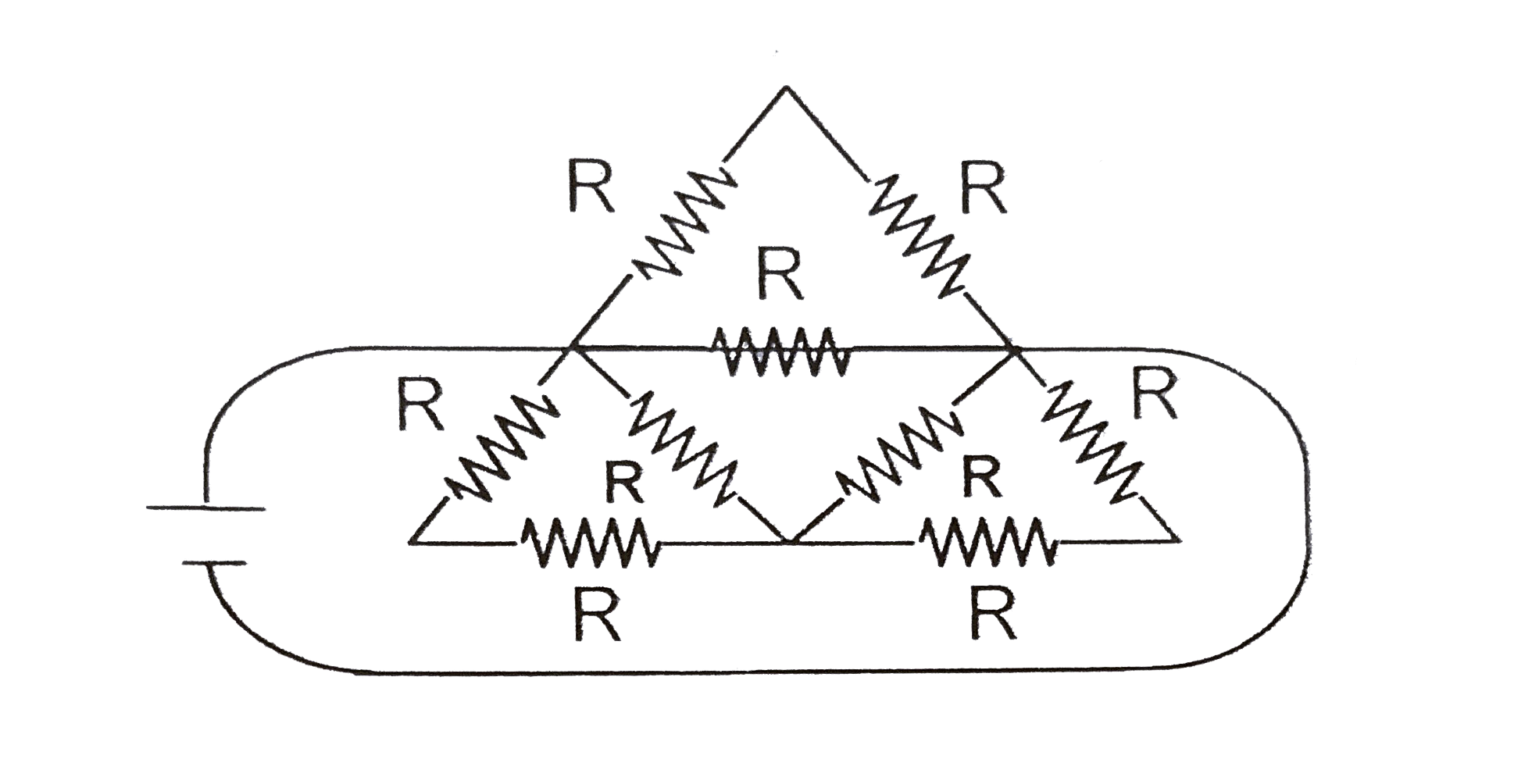A car has a fresh storage battery of emt 12V and internal resistance 5.0×10−2Ω. If the starter moter draws a current of 90A, what is the terminal voltage of the battery when the starter is on?
(b) After long use, the internal resistance of the storange battery increase to 500Ω. What maximum current can be drawn from the battery? Assume the emt of the battery to remain unchanged.
(c) If the discharged battery is changed by an external emf source, is the terminal voltage of the battery during changing greater of less than is emf 12V?
We have emf of the storage battery as ε=12V, internal resistance of the battery as r=0.5×102Ω, and current flowing through the circuit as I=90A.
(a) If V is the terminal voltage,
V=ε−lrj=12−90(5.0×10−2)=7.5V
b. We know that I=ε/(R+r), where R is sthe external
resistance. For I to be maximum (i.e., Imax,R=0 (i.e.,
the batter is to be shorted ). Thus,
Imax=εr=12V500Ω=24mA
(as after long use r=500Ω)
Clearly, the battery can now no longer be used for
starting the car.
c. During charging, the current inside the battery flows in
a direction opposite to that when it is discharging.
Clearly, replacing I by -I we get V=ε−(−I)r=ε+lr.
Hence, V should be greater then ε(=12V) during
charging.
Topper's Solved these Questions
- BOOK - CENGAGE PHYSICS ENGLISHCHAPTER - ELECTRIC CURRENT AND CIRCUITEXERCISE - Solved Examples12videos
ELECTRIC CURRENT AND CIRCUIT
- BOOK - CENGAGE PHYSICS ENGLISHCHAPTER - ELECTRIC CURRENT AND CIRCUITEXERCISE - Exercise 5.128videos
ELECTRIC CURRENT AND CIRCUIT
- BOOK - CENGAGE PHYSICS ENGLISHCHAPTER - ELECTRIC CURRENT & CIRCUITSEXERCISE - Kirchhoff s law and simple circuits15videos
ELECTRIC CURRENT & CIRCUITS
- BOOK - CENGAGE PHYSICS ENGLISHCHAPTER - ELECTRIC FLUX AND GAUSS LAWEXERCISE - MCQ s38videos
ELECTRIC FLUX AND GAUSS LAW
Similar Questions
The storage battery of a car has an emf of 12 V. If the internal resistance of the battery of 0.4Ω, What is the maximum current that can be drawn from the battery ?
View SolutionA car battery of emf 12V and internal resistance 0.05ω receives a current of 60 A from an external source, then the terminal potential difference of the battery is
View Solution
Knowledge Check
- Question 1 - Select One
The battery of a trunk has an emf of 24 V. If the internal resistance of the battery is 0.8Ω. What is the maximum current that can be drawn from the battery?
A30AB32AC33AD34A
A battery of emf 2.0V and internal resistance 0.10Ω is being charged with a current of 5.0A. Find the potential difference between the terminals of the battery?
View SolutionA battery of emf 2.0V and internal resistance 0.10Ω is being charged with a current of 5.0A. Find the potential difference between the terminals of the battery?
View SolutionA car battery with a 12V e.m.f. and an internal resistance of 0.04Ω is being charged with a current of 50A.
The potential difference V across the terminals of the battery are:View SolutionA battery of EMF 10 V, with internal resistance 1Ω is being charged by a 120 V d.c. supply using a series resistance of 10Ω. The terminal voltage of the battery is
View SolutionA 50 V battery is supplying current of 10 A when connected to a resistor. If the efficiency of the battery at this current is 25%, then the internal resistance of the battery is
View SolutionFor maximum power from battery the internal resistance of battery r is
 View Solution
View SolutionA battery of emf 10 V and internal resistance 3Ω is connected to a resistor. If the current in the circuit is 0.5 A, what is the resistance of the resistors ? What is the terminal voltage of the battery when the circuit is closed ?
View Solution
